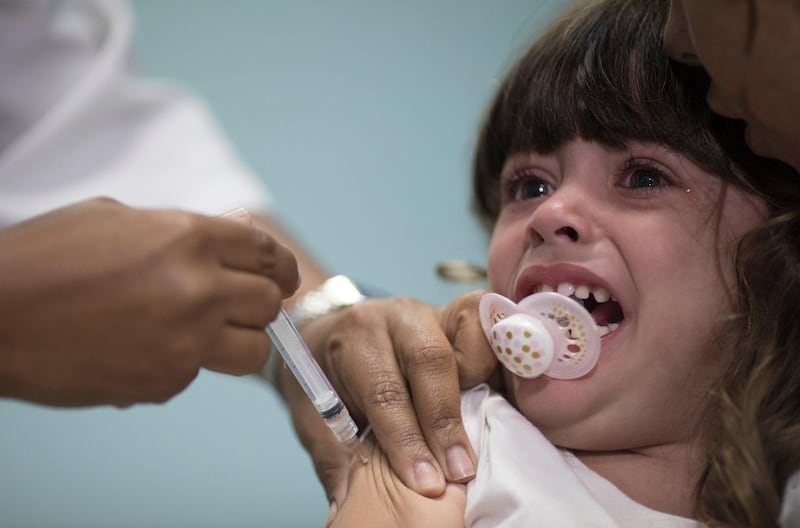Here’s a story for our time. A campaigner, an articulate, convincing talker – although a bit of an outsider –creates around himself an extraordinary media blitz. He passionately declares to anyone who will listen that he is telling the truth, despite all the controversy he has caused.
He and his supporters start appearing frequently on radio and TV programmes. Newspapers give him space to plug his views and many ordinary people appear to offer testimony to back up his claims. Who is he? Donald Trump? One of those fakers who creates a new religion for profit? A populist politician preying on the fears of the most vulnerable?
In this case, the false seer is Andrew Wakefield. He was once a British doctor but has now been stripped of his licence to practice medicine after a paper he produced 20 years ago was thoroughly discredited.
Mr Wakefield claimed that the MMR vaccine to prevent measles, mumps and rubella was linked in some way to increased cases of autism. Some scientists called him a charlatan.
The best that can be said of him is that he is guilty of the most basic scientific error, confusing correlation with causation. Just because two events take place does not mean that they are linked.
Yes, there has been an increase in reported cases of autism in many countries over the past 25 years while children have also been vaccinated for MMR. But there has also been, over the past 25 years, an increase in the use of mobile phones, budget airlines and young western women choosing to have tattoos. None of these, obviously, is linked to autism.
Mr Wakefield’s pseudo-science created a huge stir, until a number of experts pointed out that his “research” was fatally flawed nonsense. Instead of suffering shame and remorse, he moved to the United States, where his views attracted even more publicity and airtime from far-right radio shock-jocks and conspiracy theorists.
Honest scientists who rigorously questioned his phony research were derided as “the establishment” or the “elite”, as if their expertise meant they could not be trusted.
_______________________
Read more from Gavin Esler:
[ Why I joined the People's Vote campaign ]
[ Truth decay matters, whatever Rudy Giuliani and his master might say ]
[ Insect Armageddon: modern life is killing man's essential friend ]
_______________________
Now there is new evidence that a notorious internet troll factory linked to the Russian government, the St Petersburg-based Internet Research Agency, helped push Mr Wakefield’s ideas.
The Times newspaper in the UK reported that such disinformation included false claims of many deaths of children in Mexico after MMR vaccinations. The paper found "scores of accounts, either known or suspected to be tied to Russia, that churned out anti-vaccine tweets, including support for Mr Wakefield".
Three US universities broadly backed up the story in a paper entitled “weaponised health communication: Twitter bots and Russian trolls amplify the vaccine debate”.
You might think only an idiot would believe a discredited former doctor and phoney Russian tweets on the internet. But US President Donald Trump has given credence to the bogus theories and even appointed a prominent vaccine conspiracy theorist Robert Kennedy Jr to a commission on "vaccine safety and scientific integrity".
There are two reasons why this story is important now. The World Health Organisation – an international group of the so-called "elite" medical establishment — has reported that 41,000 children and adults across Europe have been infected with measles in the first six months of 2018. At least 37 have died.
The WHO talked of a “dramatic increase” in the figures. In 2016, the number of Europeans infected with measles stood at about 5,000.
The second reason why this is important is that it comes at a time when experts are routinely attacked for their expertise on other matters too.
In Britain, the debate about Brexit and leaving the European Union is constantly enlivened by trade experts and others being challenged by articulate campaigners who know nothing about trade treaties or World Trade Organisation rules and yet are given time and space on radio and television to tell us why the experts are wrong.
The very capable former British health minister Tessa Jowell once told me of the many sleepless nights she had when the Wakefield campaigners urged her to stop vaccinating children against measles.
Ms Jowell consulted the real experts, who told her that the risk from vaccinations was extremely low and the risk from not vaccinating children could be many deaths from a preventable disease. The former health minister – an intelligent, compassionate and tough-minded woman – refused to bow to those who shouted loudest but knew so little.
She kept up the vaccination programme. For doing so, she deserves the thanks of millions of British parents and their children.
But the moral of the story is clear. When some slick-talking campaigner appears on TV or radio, backed up perhaps by a lot of tweets and Facebook “likes”, ask yourself if there is anything behind the talk, any expertise, scholarship or facts.
Belief in facts and true experts, rather than snake oil salesmen and smooth talkers, might make our political decisions a lot clearer. It might even save the life of a child close to you.
Gavin Esler is a journalist, author and television presenter





